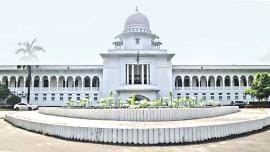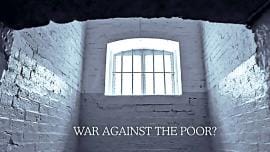Year-in Law Review / Key legislative reforms of 2025 in Bangladesh
6 January 2026, 18:00 PM
Law & Our Rights
Year-in Judgment Review / Notable Supreme Court decisions of 2025
6 January 2026, 18:00 PM
Law & Our Rights
Year-in law review / Key legislative reforms of 2025 in Bangladesh
6 January 2026, 18:00 PM
Law & Our Rights
Year-in judgment review / Notable Supreme Court decisions of 2025
6 January 2026, 18:00 PM
Law & Our Rights
Law Reform / Law reform and our farmers: Narratives of Bangladesh’s unsung heroes
26 December 2025, 18:00 PM
Law & Our Rights
Law Letter / Labour Law (Amendment) Ordinance and Due Diligence
26 December 2025, 18:00 PM
Law & Our Rights
Child rights / Child custody and the best interests of children
16 December 2025, 18:00 PM
Law & Our Rights
Law Analysis / Our inherently anti-poor vagrancy laws
16 December 2025, 18:00 PM
Law & Our Rights
Law Opinion / Pre-nuptial agreements and protection of marital rights
16 December 2025, 18:00 PM
Law & Our Rights
Law Vision / Recognising a judicially enforceable right to education
13 December 2025, 18:00 PM
Law & Our Rights
Notable Supreme Court decisions of 2025
A number of landmark decisions were handed down by the Supreme Court of Bangladesh (SCOB) in 2025. This write-up compiles some of the landmark judgments that have significant constitutional and socio-political impacts.
6 January 2026, 18:00 PM
Key legislative reforms of 2025 in Bangladesh
Bangladesh experienced major changes to its legal framework through ordinances in 2025. In total, the President promulgated 78 ordinances (at the time of writing this piece) across a wide range of areas. Most of them came into being as part of the ongoing reform process. Some of the most notable ones are discussed in this piece.
6 January 2026, 18:00 PM
Notable Supreme Court decisions of 2025
A number of landmark decisions were handed down by the Supreme Court of Bangladesh (SCOB) in 2025. This write-up compiles some of the landmark judgments that have significant constitutional and socio-political impacts.
6 January 2026, 18:00 PM
Key legislative reforms of 2025 in Bangladesh
Bangladesh experienced major changes to its legal framework through ordinances in 2025. In total, the President promulgated 78 ordinances (at the time of writing this piece) across a wide range of areas.
6 January 2026, 18:00 PM
Labour Law (Amendment) Ordinance and Due Diligence
The notion of human rights due diligence (HRDD) is a structured method, which state and nonstate actors have to apply to identify, prevent, mitigate, and account for adverse human rights impacts arising from their actions. Needless to say, an important aspect of HRDD is labour rights.
26 December 2025, 18:00 PM
Law reform and our farmers: Narratives of Bangladesh’s unsung heroes
In the countryside of Bangladesh, green paddy fields stretch for miles, nurtured by Naya Krishi farmers of Tangail. Defying modern farming, these farmers continue traditional practices by cultivating seeds passed down from their ancestors.
26 December 2025, 18:00 PM
Child custody and the best interests of children
The question of who will get the custody of a child after a divorce or separation is not merely a family concern in Bangladesh, but also a question of justice, welfare, and rights. One of the primary goals of a legal system is to ensure that every decision that concerns custody is taken in the best interest of the child.
16 December 2025, 18:00 PM
Pre-nuptial agreements and protection of marital rights
Marriage is a promise and a legal relationship that creates rights and obligations between a couple. While months are spent on wedding planning, little consideration is given into planning the legal and financial obligations of the partners.
16 December 2025, 18:00 PM
The intersection of transboundary water conflicts and human rights
When the United Nations General Assembly, in 2010, affirmed that ‘the right to safe and clean drinking water and sanitation’ (Resolution 64/292) is a human right, it impliedly recognised water as a fundamental legal entitlement connected to dignity, health, and life.
13 December 2025, 18:00 PM
Navigating our case backlogs and some proposals for reform
‘Justice delayed is justice denied’- the aphorism has become a lived reality for many Bangladeshi victims. Our courts are groaning under a mounting backlog: by the end of 2024, roughly 4.5 million cases were pending across the judiciary, with well over 3.8 million cases in the lower courts alone.
4 December 2025, 18:00 PM
Can an approver be punished?
The International Crimes Tribunal (ICT)-1 has recently delivered the first verdict concerning the crimes against humanity committed during the July uprising.
4 December 2025, 18:00 PM
Cyber harassment against women and our legal shortcomings
A case was recently filed under the Cyber Security Ordinance 2025 after a manipulated image of a female faculty member of the University of Dhaka had been posted on the internet with derogatory captions and remarks.
25 November 2025, 18:00 PM
Consultation with the Chief Justice in appointing SC judges
Article 95(1) of the Constitution of Bangladesh mandated the President to consult the Chief Justice (CJ) when appointing Supreme Court (SC) judges.
18 November 2025, 18:00 PM
The draft Telecommunication Ordinance 2025
For decades, Bangladesh’s digital network has operated under the constant threat of arbitrary executive interferences. Access to the internet could be severed without notice or remedy whenever there emerged any political tension within the country.
18 November 2025, 18:00 PM
New data laws in Bangladesh: A critique
Bangladesh has entered a new phase in its digital governance story with two Ordinances, namely, The Personal Data Protection Ordinance 2025 (PDPO) and the National Data Management Ordinance 2025 (NDMO). Their appearance, almost devoid of public discussion, invites reflection: are we witnessing the long-delayed codification of digital rights, or the rise of a data-centric State?
18 November 2025, 18:00 PM
Progressive evolution of guardianship laws in Bangladesh
A “guardian” is someone who takes care of a child, looks after the child’s property, or both, according to Section 4(2) of the Guardians and Wards Act, 1890. However, under Muslim law, guardianship is divided into two types based on function: Waliyat alal Nafs and Waliyat alal Mal.
13 November 2025, 18:00 PM
The curious case of S Alam and our investment treaty regime
The S Alam group has recently lodged an arbitration claim against Bangladesh at the International Centre for Settlement of Investment Disputes (ICSID). This event is significant for our investment law regime. The claim was made under one of our older Bilateral Investment Treaties (BITs) with Singapore from 2004.
13 November 2025, 18:00 PM
Death by negligence and our legal rights
The recent Farmgate tragedy, in which a man lost his life after being struck by a bearing pad falling from the Metrorail infrastructure, comes as a timely reminder of how public safety is too often sacrificed to negligence.
4 November 2025, 18:00 PM
Transitional solutions for refugee protection through the lens of the Rohingya crisis
Around the world, many people are forced to leave their houses, country of origin and cross borders to find dignity and safety from conflict, persecution and gross violation of human rights.
4 November 2025, 18:00 PM
Int’l Day of Care and Support
Care work consists of two overlapping activities: direct, personal and relational care activities, such as feeding a baby or nursing an ill partner; and indirect care activities, such as cooking and cleaning.
29 October 2025, 18:00 PM





























